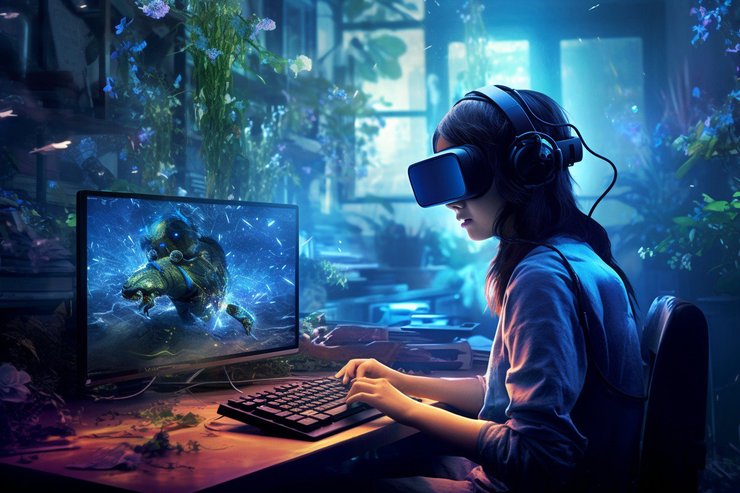Table of Contents
When you pick up a video game controller and embark on a virtual adventure, you're not just entering a world of entertainment – you're stepping into a realm shaped by Artificial Intelligence (AI). In today's gaming landscape, AI is the unsung hero that breathes life into pixels, bringing characters to existence and orchestrating the dynamics of game worlds. This article explores the symbiotic relationship between AI and video games, unraveling the intricate ways in which AI technologies have woven themselves into the fabric of gaming. Beyond just enhancing gameplay, AI in video games has become a creative force, crafting compelling narratives, and driving player engagement. So, fasten your seatbelt as we embark on a journey to uncover the vital role and profound significance of artificial intelligence in the world of video games.

AI in Non-Player Characters (NPCs)
Imagine a virtual world where the inhabitants think, react, and adapt just like real individuals. This level of immersion is brought to life by the intricate Artificial Intelligence (AI) that powers Non-Player Characters (NPCs) in modern video games. These digital denizens have transcended mere scripted responses, evolving into dynamic entities that can surprise and engage players in unexpected ways. Let's delve into a few standout titles that showcase the impressive capabilities of advanced NPC AI:
- Deus Ex: Human Revolution: In this cyberpunk masterpiece, NPCs exhibit behaviors influenced by the game's rich narrative and player choices, offering a glimpse into a complex dystopian society.
- Horizon Zero Dawn: The mechanical creatures and human NPCs in this open-world epic demonstrate AI-driven interactions and decision-making, contributing to a vibrant and ever-evolving game world.
- Red Dead Redemption 2: Rockstar's Wild West opus presents NPCs with nuanced personalities and daily routines, crafting an authentic and immersive frontier experience.
- The Witcher 3: Wild Hunt: Geralt's adventures are made more enthralling by NPCs who display lifelike reactions, adding depth to quests and the game's sprawling world.
These examples illustrate the remarkable progress in AI-driven NPC behavior, blurring the line between reality and the virtual realm, and making every encounter in these games a unique and captivating experience.
AI in Enemy Behavior
Within the captivating realm of video games, the orchestration of adversaries takes on a profound dimension through the intricacies of Artificial Intelligence (AI). AI plays a dual role in this domain: to craft foes that pose substantial challenges to players and to infuse these digital adversaries with a lifelike quality, akin to the unpredictability found in the real world. The significance of AI in shaping enemy behavior extends far beyond scripted actions. It empowers game developers to harness a diverse array of advanced techniques, giving rise to in-game opponents that are not only formidable but also astonishingly realistic. Machine learning algorithms grant enemies the ability to adapt dynamically, learning from players' strategies and continually evolving their own tactics. In tandem, sophisticated pathfinding algorithms bestow adversaries with the intelligence to navigate game environments astutely, allowing them to seek cover, coordinate attacks, and execute strategic maneuvers, such as flanking, with precision. This fusion of behavioral algorithms and machine learning doesn't just elevate the game's difficulty but immerses players in a realm where enemies exhibit human-like reactions and adaptability, delivering an unparalleled and immersive gaming experience that leaves an indelible mark on the player's psyche. Uncover the next level of gaming intensity at Slotoro.
AI in Game World Generation
Embark on a journey into the captivating realm of video game creation, where Artificial Intelligence (AI) emerges as the hidden artisan behind two essential facets: procedural generation and the cultivation of dynamic, ever-evolving game worlds. Within this domain, AI assumes the role of the unseen architect, breathing life into virtual landscapes, not just as static environments but as entire universes that ebb and flow in response to player interactions.
| Aspect | Description |
| Procedural Generation and AI | AI algorithms seamlessly collaborate with procedural generation techniques, automating the creation of vast, intricate game terrains, cities, and ecosystems. Through AI, developers can weave together landscapes that exhibit natural diversity and uniqueness. This synergy ensures that every playthrough offers a fresh and distinctive adventure, thanks to AI-driven procedural generation. |
| Creating Dynamic and Evolving Game Worlds | AI infuses game worlds with a pulsating dynamism, orchestrating elements like weather patterns, day-night cycles, and population behaviors that react to player choices. The result is an immersive and ever-changing gaming experience where no two moments are alike, making each exploration of the virtual universe a captivating odyssey. |
The table above paints a vivid portrait of AI's transformative role in game world generation. Procedural generation and dynamic, ever-evolving game realms underscore AI's remarkable ability to craft immersive and ever-shifting gaming environments, inviting players to embark on a journey of exploration, discovery, and enchantment within the boundless tapestry of the virtual world.
AI in Player Experience Enhancement
Enter the captivating world of video games, and you'll discover the profound impact of Artificial Intelligence (AI) on elevating the player's journey. AI revolutionizes storytelling through its innovative approach known as AI-driven storytelling, where narratives adapt and evolve based on player choices. This dynamic narrative structure empowers players to co-author the game's storyline, immersing themselves in a world where their decisions shape the unfolding drama, resulting in an intensely personalized and engaging experience.
Furthermore, AI goes beyond narrative enrichment, extending its influence to tailor gameplay experiences to individual players. Through meticulous analysis of player behavior and preferences, AI algorithms craft bespoke adventures, adjusting difficulty levels, offering customized challenges, and delivering tailored recommendations. This personalized touch ensures that each player embarks on a unique journey, honing their skills while forging a deep and intimate connection with the virtual realms they explore. AI-driven storytelling and personalized gameplay epitomize the boundless potential of AI in crafting unforgettable gaming experiences that leave an indelible mark on the player's psyche.
AI in Game Testing and Balancing
Unlock the secrets of video game development, where Artificial Intelligence (AI) emerges as a formidable ally in the domains of game testing and difficulty equilibrium. AI's prowess becomes evident in its ability to revolutionize game testing procedures, automating previously labor-intensive tasks. With AI-driven testing, developers can swiftly identify and rectify issues, guaranteeing a smoother and more refined gaming experience, free from the clutches of bugs and glitches.
Furthermore, AI algorithms take center stage in orchestrating balanced gameplay experiences. By meticulously dissecting player behavior and performance data, AI can dynamically fine-tune a multitude of game parameters, including enemy strength, puzzle intricacy, or resource availability. This adaptive approach ensures that games remain engaging without veering into overwhelming difficulty, accommodating a wide spectrum of players, from novices to seasoned enthusiasts. The end result is a harmonious gaming experience where each player discovers their optimal level of challenge, amplifying overall enjoyment and player satisfaction.
Ethical Considerations
Embarking on our exploration of the world of video games, it's essential to delve into the ethical dimensions brought forth by the integration of Artificial Intelligence (AI). As AI's presence expands in the gaming landscape, it casts a spotlight on critical ethical questions. These encompass concerns related to data privacy, the potential for AI-driven addiction, and the responsible depiction of sensitive content within games.
A paramount responsibility rests on the shoulders of developers and industry stakeholders to ensure that AI is wielded ethically, prioritizing fairness, transparency, and accountability. The ethical use of AI is vital in preventing unintended consequences, discriminatory practices, or the manipulation of player behavior. Striking a delicate balance between innovation and responsible AI implementation is fundamental to fostering a gaming environment that not only pushes the boundaries of creativity but also respects the rights and well-being of players.
Future Trends
As we set our sights on the ever-evolving landscape of the gaming industry, the horizon unfolds with the promise of groundbreaking Artificial Intelligence (AI) technologies. These technological marvels are poised to be the architects of a new era in video games, introducing advanced machine learning, natural language processing, and sophisticated computer vision that will redefine the very essence of gaming.
Within this era of AI integration, we anticipate a seismic shift in gameplay and player experiences. The ongoing evolution of AI holds the potential to usher in a gaming renaissance characterized by dynamic, lifelike Non-Player Characters (NPCs), procedurally generated content ensuring endlessly diverse and evolving game worlds, and gameplay that seamlessly adapts to the unique preferences and styles of individual players, delivering deeply personalized and immersive adventures.
Furthermore, the harmonious fusion of AI and gaming is poised to open doors to uncharted territories, including immersive virtual reality, augmented reality, and mixed reality experiences that transcend conventional boundaries. This convergence is set to revolutionize not only the mechanics of gameplay but also storytelling, offering players a future where the very essence of the gaming experience is transformed in ways previously unimagined.
As we embark on this exhilarating journey into the future, the symbiotic relationship between AI and gaming serves as a beacon of boundless innovation. Here, the realm of video games unfolds as an ever-expanding canvas of creativity and wonder, where possibilities are limitless and the potential for awe-inspiring gaming experiences is unparalleled.
Experts' Views
Experts in the field of both artificial intelligence (AI) and video games have shared intriguing perspectives on the integration of AI in gaming. Renowned AI researcher Dr. Alice Chen commented, "AI in video games is evolving at an unprecedented pace. We're witnessing AI-driven NPCs that not only respond to player actions but also exhibit human-like emotions and adapt to the player's gaming style."
Furthermore, John Reynolds, a game developer with over two decades of experience, stated, "AI is no longer just about enemy behavior it's about creating immersive worlds that feel alive. Procedural generation algorithms, empowered by AI, are enabling game worlds that evolve dynamically, offering players endless exploration and discovery."
From an ethical standpoint, Dr. Sarah Rodriguez, an AI ethicist, emphasized, "With AI becoming a fundamental part of gaming, ethical considerations are crucial. Game designers must ensure that AI respects player privacy, avoids bias, and promotes responsible gaming."










Comments